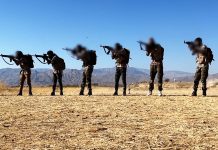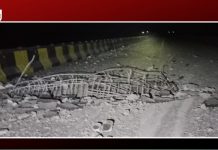Pakistan has a long history of Human Rights violations. Since the formation of Pakistan by the British in 1947, it has been indulged in protecting and sheltering international terrorists and has unleashed them in the region and beyond.
Author: Hayr Bux Baloch
In a recent interview with Stephen Sackur on BBC’s HARDtalk, National Security Advisor to the Prime Minister of Pakistan, Moeed Yusuf was asked about the thousands of Balochistanis who have been ‘forcibly disappeared’ in Balochistan. With a straight face, he brazenly lied and deceived the world by claiming “If there is any issue, any incident where excess has been committed, we will respond as a responsible state does. An overwhelming majority are found to be terrorist or (involved) in heinous crimes who went and fought somewhere and died”.
The interviewer was evidently befuddled. He pressed advisor assuming he might want to recant or at least rephrase the answer, so he pressed “interesting use of the conditional ‘If’. Are you telling me that for all the exhaustive human rights reporting, you do not accept that there are grave abuses in Balochistan?”.
The answer to the query could not have been more profoundly boorish. He not only blatantly denied the human right violations so frequently taking place in the forsaken land of Balochistan, he outright rejected the word ‘grave’ used by the interviewer. Although many analysts would call such behaviour as analogous to a ‘rouge’ state, it should be noted that this is not the first time. Pakistan has a history of lying about human rights on an international platform.
Pakistan’s establishment and its representatives have a long history of deceit and duplicity. In a short history of its turbulent existence, Pakistan has been (rightly) accused of fraud, hypocrisy, as well as treachery. No matter which party is in government, outright dictatorship or a shammed democracy, the state has been in the manacles of an overpowering establishment. They have used every means in the book to maintain the status quo, be it overthrowing democratically elected Prime Ministers, to the use excessive violence that would constitute a war crime. The interview could not have come at a worse time for the state of Pakistan as it deplores the 50th anniversary of the breaking up of its eastern wing.
In 1971, almost 95,000 strong Pakistani army surrendered against India after only a fortnight of fighting them. The Indian military had entered only 16 days prior after many reports of an alleged genocide, ethnic cleansing, and crime against humanity taking place in the formerly known East Pakistan. Up to 3 million Bengalis were ruthlessly slaughtered and an estimated 10 million displaced by the Pakistani army and its affiliated vigilantes according to Human Rights Watch. It was only after the intervention by the Indian army that ended the nine months of violence and the emergence of the newly formed Bangladesh.
History does not repeat itself; but it often rhymes. And that is precisely what has not been able to realise. They are repeating the same gruesome human rights violation in Balochistan. According to Voice for Baloch Missing Persons, more than 50,000 Baloch have been forcibly disappeared by the security agencies and their affiliates. Many of those disappeared were found dead with mutilated bodies in different part of Balochistan. Furthermore, with an uncanny resemblance of the Bengal Genocide, several mass graves have been found in the unfortunate region.
In addition to that, as if the establishment has not learned any lessons from their malicious endeavours in the East, the same religious militias are being fostered in Balochistan. The impunity with which these militants carry out gruesome violence and atrocities has a familiar tone. The world has seen the same dirty tactics when Pakistan supported terrorists’ groups such as Al-Badr and Al-Shams carried out gross human rights violations in East Pakistan. It should be known that feeding such monsters in the past has not served Pakistan well. In spite of a backlash from such entities as the recent splinter of the Pakistan supported Taliban have carried out various attacks against Pakistan.
Pakistan has a long history of Human Rights violations. Since the formation of Pakistan by the British in 1947, it has been protecting and sheltering international terrorists and has unleashed them in the region and beyond. It has provided safe haven to every terrorist outfit in the hopes of using them for their personal malicious agenda in South Asia and beyond. it is, for this matter, a little perplexing as to why the international community has been unable to take stricter measures against Pakistan.
It is, for these matters, quite self-evident that if this expansionist state that so naturally harbours terrorism and audaciously rejects any blame should be stopped. With more stringent measures, the international community must come together to halt the abuses a common Balochistani has to face in their everyday life. The fact that people in Balochistan are being exterminated every other day is an act of crime against humanity. Until and unless the international community comes together and stops these people committing human rights violations, there seems to be no end in sight for this madness to stop.






























